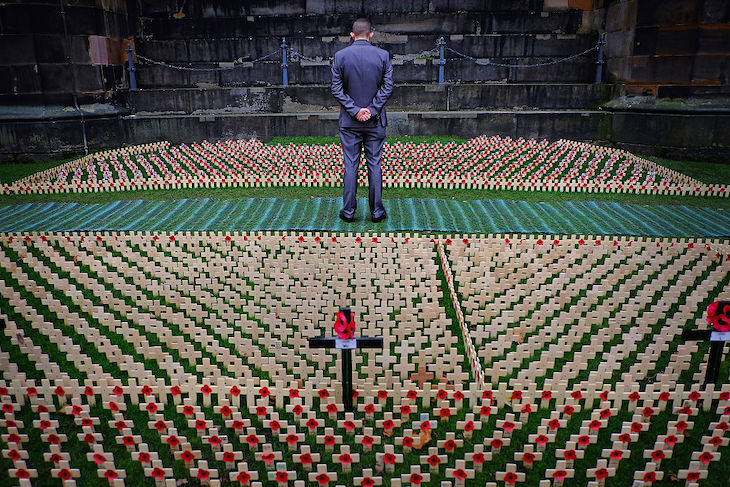Armistice Day is an appropriate moment to reflect on why democracies triumphed in the two world wars that blighted the twentieth century. The simple answer is because – however much they hesitated – they believed in what they stood for and were able to will their victory. As the French philosopher, future Resistance member and champion of post-war liberal democratic values, Raymond Aron, wrote in June 1939:
‘I believe in the final victory of the democracies, but on the one condition, that they should want it.’
So Britain could mobilise its population for war to an extent unequalled by totalitarian states, without using totalitarian methods.
For all the loose talk of World War III, global wars are only predictable with hindsight
Should western democracies once more be forced into war, it is by no means clear that they would have the self-belief and Aron’s will to win. That requires the cohesive feeling of national community, built up over centuries and forming a heritage of shared memories, still to be intact. That, in turn, requires not only its citizens having things in common, but also putting to one side the worst excesses of their past rather than dwelling on them. By that means they achieve what the nineteenth century French historian, Ernest Renan, called the ‘daily plebiscite’ necessary for a nation to exist now and into the future.
Western democracies had that. Yet in recent years they have succumbed to a fit of deconstructing their common heritage, emphasising division in past and present. In undermining the comparative advantage they had over authoritarian regimes, they are playing into the hands of their rivals and making war more likely.
Even during the Cold War, when western democracies were prey to internal dissenting voices, the vast majority of their citizens believed in their shared values and futures. That faith acted as a deterrent to potential challengers. Western armaments and shared values ensured that the Cold war stand-off did not descend into world war. As Raymond Aron quipped of the Cold War: ‘Peace impossible, war improbable’.
What would he have made of the state of today’s international relations with western democracies again at loggerheads with authoritarian regimes determined to change the international order? The glaring difference is the state of western democracies and the gangrenous erosion of their shared values and sense of community and their declining will to defend what remains of them. The authoritarian regimes that seek to change the international order smell the weakness of the West, as did the Axis powers in the 1930s. For the moment they can afford to wait: China to increase her military build-up, North Korea to hone its nuclear delivery systems, Iran to develop its nuclear weapon. All wait and watch as western democracies slide into ever more self-loathing and self-harm, and, as in the 1930s, avoid facing reality and taking the necessary steps to defend themselves, beginning with self-belief.
As that happens, so third party states, the Global South for instance, will begin opportunistically to calculate the cost-benefit of siding against the West. Russia made its move too soon in invading Ukraine. Putin rightly sensed the West’s declining belief in its shared heritage, but acted before its resolve had sufficiently waned.
Yet for all the loose talk of World War III, global wars are only predictable with hindsight. Teleology alone assures us that the First World War would break out in 1914. After all, Europe had been at peace for four decades. And though the international system was divided into two blocs of alliances stand-offs and flashpoints came and went. The 1911 Franco-German diplomatic confrontation over Morocco was defused. The internecine Balkan Wars of 1912-13 and 1914, in which the rival international alliances had a stake, came to naught. The German fleet was scheduled to join the British fleet on manoeuvres in the summer of 1914. In the spring of 1914 the Permanent Under-Secretary of the Foreign Office had never seen ‘calmer waters’. Examples of détente were legion.
Even prior to World War II, potential international crises did not escalate. The Spanish Civil War did not cause Britain and France to intervene on the Republican side against the Axis-backed Franco forces. Meanwhile Munich promised ‘peace in our time’.
But what was common to the genesis of both world wars was a sense of opportunity based on perception of their own and their rivals’ strengths and weaknesses. In the summer of 1914, Imperial Germany preferred to risk war rather than, in its eyes, countenance further decline of its Triple Alliance against a rising Triple Entente. For Hitler’s Germany, the perception of decadent, irresolute and appeasing French and British democracies determined him to seize the moment. That both calculations proved erroneous in the end is immaterial given that world wars ensued.
Today, given the West’s dismal pathology, rivals for its increasingly threatened global mastery will be calculating how and when to erode further the democracies’ shrinking comparative advantage. Its weakness signals opportunity and invites challenge. Democracies may in the end prevail, but the consequences would be appalling.







Comments